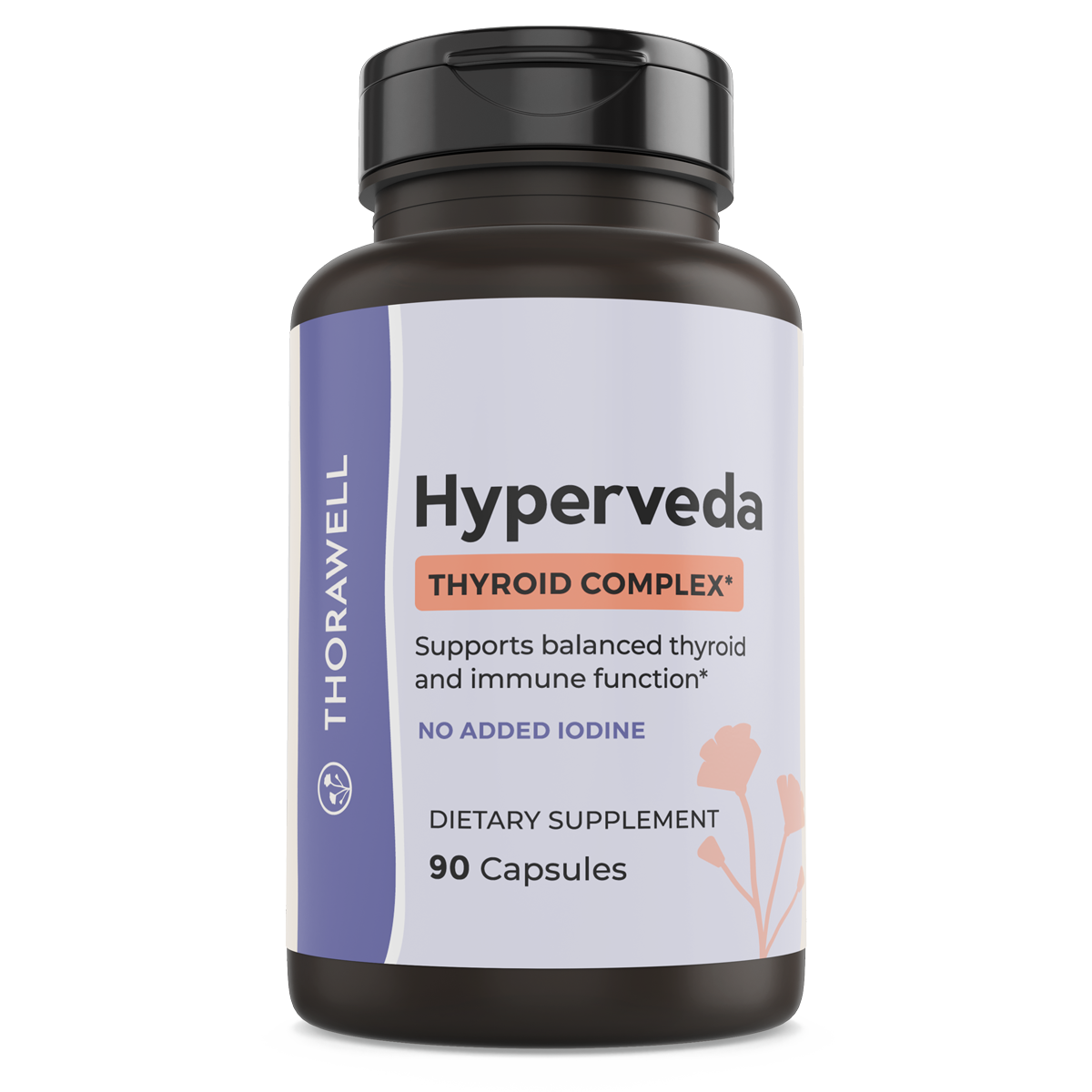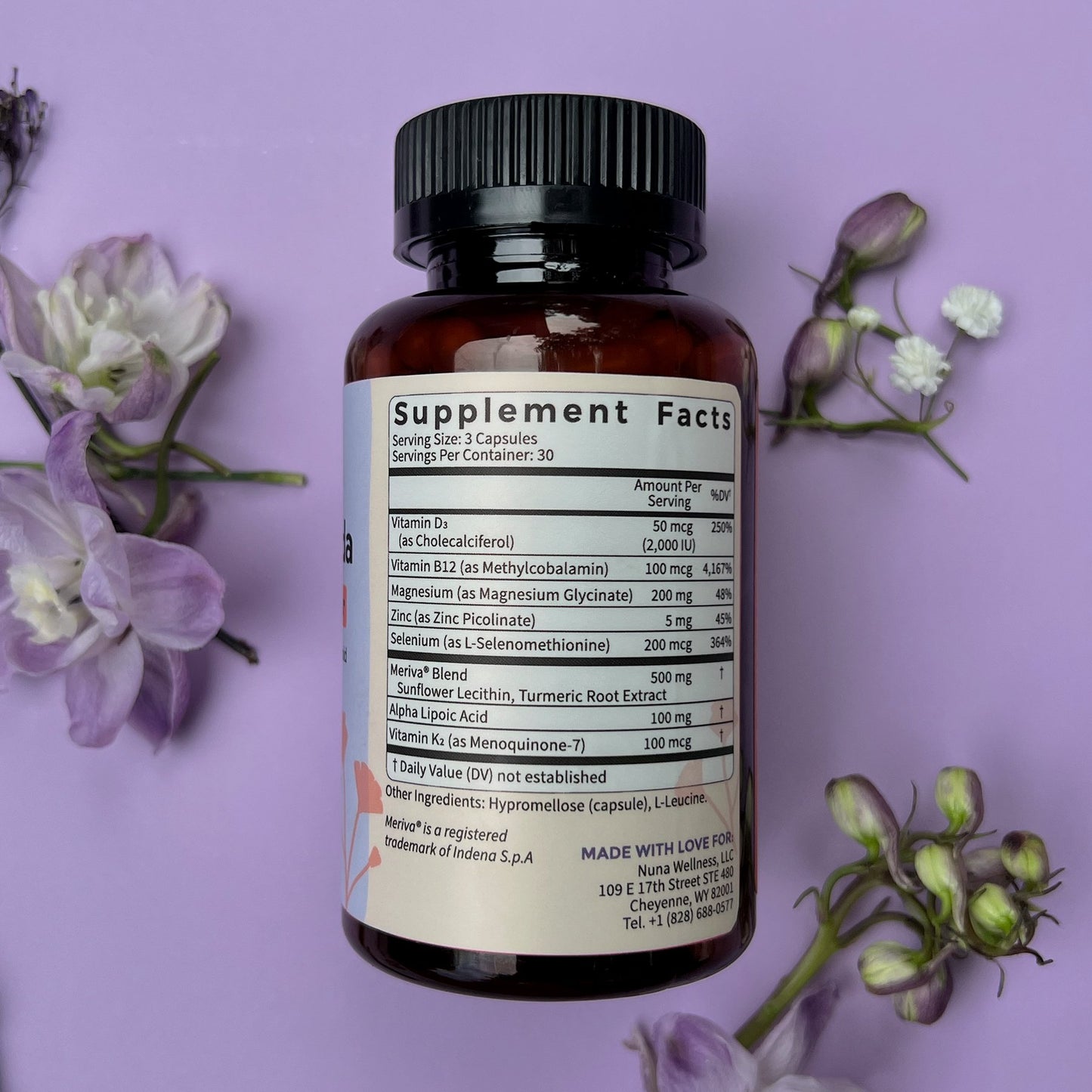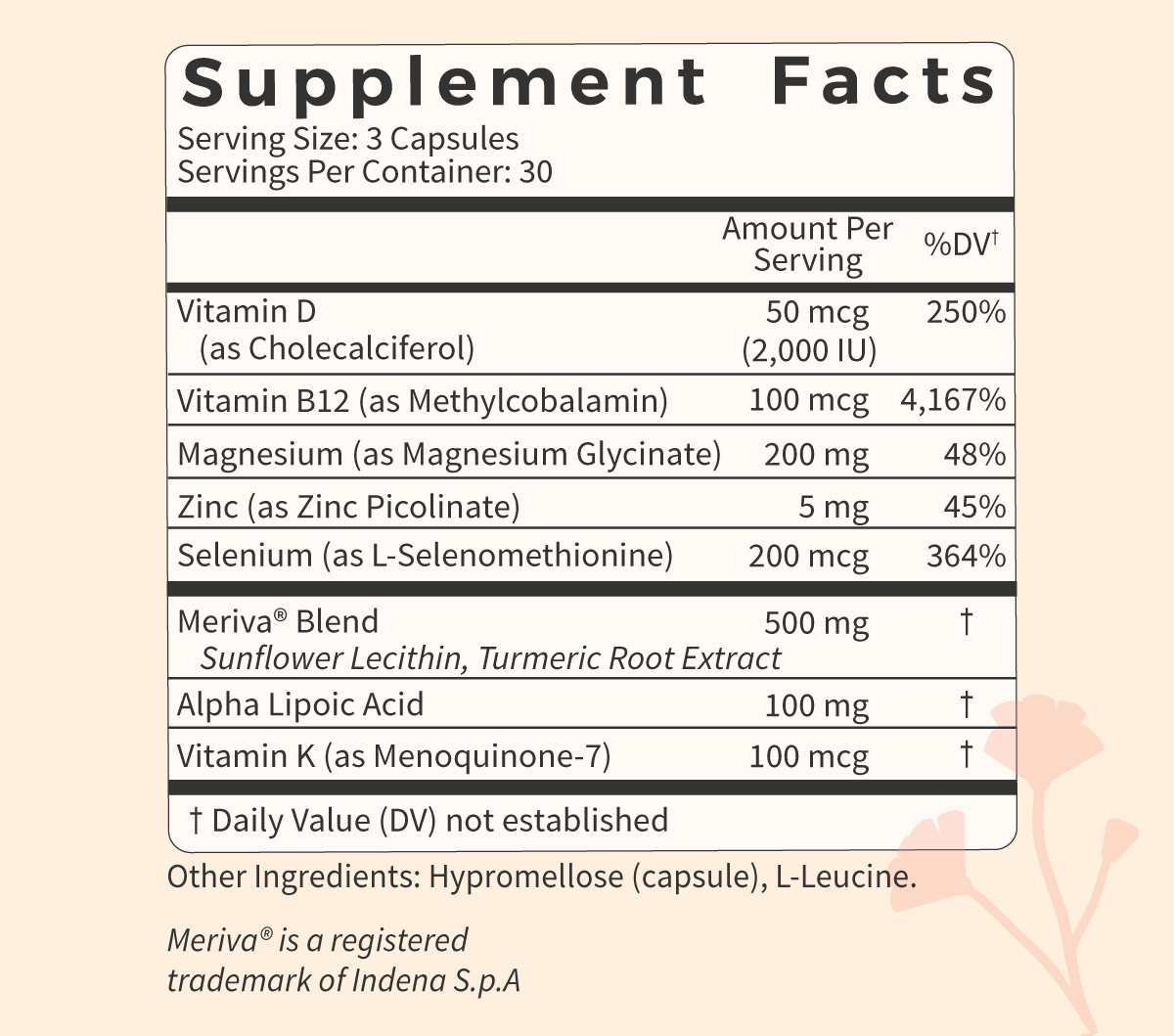In this article
- What is hyperthyroidism?
- What is the best diet for hyperthyroid?
- Vitamin D3
- Vitamin B12
- Magnesium
- Zinc
- Selenium
- Turmeric
- Vitamin K
- Alpha Lipoic Acid
- Conclusion & Our Recommendation
If you've made it here, that means you're already taking steps to control your health as best you can. You should be proud of yourself! What I've learned throughout my journey with Graves' Disease is that we are our own best advocates, and understanding our disease is incredibly important.
Let's start with the basics.

What exactly is hyperthyroidism?
Your thyroid, a small but mighty butterfly-shaped gland in the front of your neck, is responsible for releasing hormones in charge of how your body uses energy. Hyperthyroidism happens when your thyroid gland goes into overdrive, producing too much thyroid hormone. This overproduction can lead to symptoms such as rapid heart rate, weight loss, and anxiety.
I can't stress this enough: medical treatment is necessary. That being said, a healthy, balanced diet can help manage and alleviate symptoms associated with hyperthyroidism, and make life more enjoyable.
What is the best diet for hyperthyroidism?
I wish I could say there is one magical list of diet do's and don'ts that can apply to everyone. However, one thing that is for certain is that the best diet for an overactive thyroid is one that keeps inflammation under control. This can vary person to person, but a general rule of thumb would be to ensure that every meal you eat is providing nutrition for your body.
Below are a list of vitamins, minerals, and antioxidants that you should strive to include in every meal.
Which vitamins and minerals are important for women with hyperthyroidism?
Vitamin D3
Think of Vitamin D3 as the sunshine vitamin. It’s crucial for maintaining healthy bones, as it helps the body absorb calcium. It also plays an important role for the functioning of many organs (including the thyroid), immune function and mood regulation.
For individuals with hyperthyroidism and Graves' disease, Vitamin D3 can help reduce inflammation and modulate the immune response, potentially alleviating some of the autoimmune aspects of these conditions.
Studies have shown that people with thyroid disorders often have low Vitamin D levels, so testing your levels is important. Adding a bit more sunshine in your life (or a supplement) could do you wonders.
Some studies also suggest that low levels of Vitamin D are linked to higher anti-thyroid antibodies, and might make thyroid disorders worse or speed up their development. Supplementation with Vitamin D often reduced these antibody levels.
Sources of vitamin D:
- Fatty fish (like salmon, tuna, sardines and mackerel)
- Egg yolks
- Some mushrooms such as shiitake and white button mushrooms, but make sure to place them under the sun before consuming them to boost their Vitamin D content, or select “UV exposed” mushrooms from your supermarket.
- Sun exposure
Vitamin B12
Think of Vitamin B12 as a spark plug for your body’s engine. It is important for nerve function, red blood cell production, DNA synthesis, and can help maintain your energy levels up. It helps keep the body's nerve and blood cells healthy and can prevent a type of anemia that makes people tired and weak.
A study found that women with hyperthyroidism often have significantly lower levels of Vitamin B12, suggesting a possible link between high thyroid hormone levels and decreased B12. Low levels of Vitamin B12 can also lead to fatigue, nausea, tingling of the hands and feet, and other symptoms. Ensuring you get enough B12 can help keep your energy up and your nerves steady.
Sources of Vitamin B12:
- Meat, poultry, and fish
- Eggs
- Clams
- Animal liver and kidneys
- Fortified foods, such as breakfast cereals
Something to note, vegetarians and vegans may need to consider B12 supplements.
Magnesium
Magnesium is involved in over 300 biochemical reactions in the body, including energy production and protein synthesis. Yep, it’s that important.
Magnesium also plays a role in maintaining normal nerve and muscle function, which is particularly important for those experiencing the cramps and weakness often associated with thyroid disorders.
Sources of magnesium:
- Leafy greens such as spinach, kale, swiss greens
- Nuts, seeds, and whole grains
- Legumes, including black beans, chickpeas and lentils
- Fish: mackerel, salmon, halibut

How to include it in your diet:
Add lush greens to your salads, smoothies, or sauté them as a side dish. Make a hearty bean soup, add chickpeas to salads, or prepare a lentil stew. You can also blend legumes into dips like hummus. When you’re in need of a snack, go for a handful of nuts or seeds, or sprinkle them over yogurt or oatmeal.
Zinc
Zinc is a nutrient that helps your immune system fight off infections, aids wound healing, and helps your metabolism work properly. A lesser known fact is that zinc is used by our bodies to make DNA and protein.
It is also necessary (you guessed it!) for the proper function of the thyroid gland and the production of thyroid hormones. Studies have shown that low zinc levels may contribute to both hypothyroidism and hyperthyroidism.
To ensure adequate zinc levels, we suggest adding these to your diet.
Sources of zinc:
- Oysters
- Beef
- Pumpkin seeds
- Chickpeas are a good plant-based source
Selenium
Although your body cannot naturally produce it, selenium is an essential antioxidant that helps protect cells from damage. It has also been shown to be beneficial to some people with hyperthyroidism and thyroid eye disease.
Some studies have found that supplementing selenium in people with mild to moderate thyroid eye disease (Graves' orbitopathy) can actually boost their quality of life and eye health, and have found a relationship between low selenium levels and increased risk of thyroid disease in women. Additionally, a study from 2023 suggests that supplementing with 200 micrograms of Selenium per day may lower thyroid antibodies.,
Sources of selenium:
- Brazil nuts
- Fish, such as yellowfin tuna
- Eggs
- Ham, beef, turkey, and chicken
- Sunflower seeds
|
Important to note: Selenium has an upper intake limit of 400 micrograms for adults. A single brazil nut can have up to 100 micrograms, so be wary of not eating too many. A supplement might be a good idea to have better control of the amount consumed. |
Turmeric
Turmeric has been a go-to for its medicinal and culinary magic for almost 4000 years. This popular golden spice from the ginger family is packed with curcumin, a powerful anti-inflammatory and antioxidant compound.
Curcumin has been shown to modulate immune responses and reduce oxidative stress, making it helpful for managing autoimmune thyroid conditions.
One study in particular found that turmeric use was associated with reduced goiters in the studied group.
How can I incorporate turmeric in my diet?
Turmeric can be added to curries, roasted veggies, soups, and smoothies. Add a little extra black pepper for better absorption.
Vitamin K
Vitamin K plays a vital role in women's health in a number of ways, including bone health, blood clotting, and hormonal balance.
For those with hyperthyroidism who are at a higher risk of bone loss, Vitamin K is particularly important. It supports bone health by helping with calcium absorption and improving bone metabolism, acting as a shield against the risks of weak bones.
For strong bones and joints, consider adding the following staples to your diet.
Sources of vitamin K:
- Leafy greens like kale, spinach, and broccoli
- Brussel sprouts
- Green beans
- Dry roasted cashews
- Natto (fermented soy beans)
Alpha Lipoic Acid
Despite its intimidating name, alpha lipoic acid (ALA) is a friendly, versatile antioxidant that helps protect cells from damage and supports your body’s energy production. It’s made in small amounts in your body, and can also be found in pantry staples such as spinach, broccoli, and potatoes.
ALA has a special power that not all antioxidants have: because it’s fat and water soluble it can work throughout your entire body. It also offers a helping hand to other antioxidants such as Vitamin C and E by regenerating them and making them more effective.
But how is alpha lipoic acid good for thyroid health? Women with thyroid disorders often experience high levels of inflammation due to excess cytokines, which are immune-system proteins that can harm organs. Alpha Lipoic Acid (ALA) can help by reducing free radicals and cytokines, particularly in lung tissues and the gut. This makes ALA a valuable helping hand in managing inflammation for those with thyroid conditions.
Sources of ALA:
- Spinach
- Broccoli
- Potatoes
*Please keep in mind, this is NOT a complete diet guide, but does include recommendations to help you get started. As always, consult with your physician before taking any dietary supplements.
Conclusion
Hyperthyroidism, or an overactive thyroid, is a health condition that affects many women worldwide. It can cause symptoms like rapid heartbeat, weight loss, anxiety, increased appetite, and heat intolerance, among many others.
While there’s no magical diet, eating the right nutrients and appropriate supplementation can help manage hyperthyroidism symptoms and improve your quality of life. For those who struggle to get enough of these nutrients through diet alone, supplements can be a helpful addition.
Here are a few tips for choosing the right supplements:
- Go for magnesium glycinate: This form of magnesium is gentle on the stomach and well-absorbed.
- Pair Vitamin D3 with Vitamin K: These vitamins work synergistically to support bone health.





